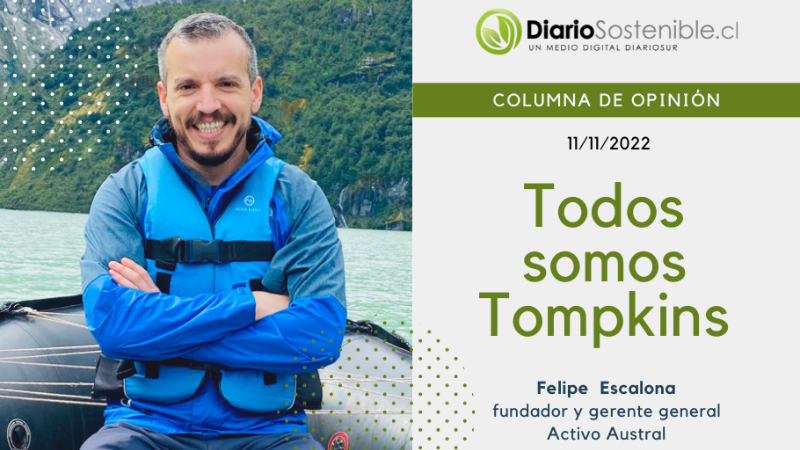
We are all Tompkins
In this opinion column published in Diario Sostenible, the founder and CEO of The Real Eco State, Felipe Escalona, discusses the importance of caring for natural ecosystems and how people can join in this action.
In this opinion column published in Diario Sostenible, the founder and CEO of The Real Eco State, Felipe Escalona, discusses the importance of caring for natural ecosystems and how people can join in this action.
The protection of the environment, in the face of the increasingly manifest threat of global warming, should be a matter of concern for all of us.
At the COP27 being held these days in Egypt, the World Health Organization (WHO) called on the governments of the world to take concrete actions using a terrifying fact: at least 15 thousand people have died this year due to heat waves.
This is an issue that we in Chile should be particularly concerned about, as it is one of the countries that, according to several studies, is being most affected by climate change.
We are feeling it year after year with increasingly hotter summers, progressively less rainy winters, the advance of desertification towards the central area of the country and scarce but intense rainfalls, when they occur.
In the crusade to take care of our natural ecosystems, we are all called to contribute, but many wonder how they can take actions that effectively make a difference, since they do not possess large resources or fortunes that allow them to scale such actions.
Through different market solutions, there are more and better incentives to be socially responsible when we invest.
What is known as Impact Investment today includes a growing range of clean energy projects, responsible resource management, waste treatment and conservation of natural landscapes to avoid the depredation that, for example, the Amazon is currently experiencing.
In Chile we have seen this, for example, with the Tantauco Park in Chiloé or the large extensions of land that the Tompkins Foundation bought in Aysén with the sole purpose of preventing them from being urbanized or exploited for commercial purposes.
But fortunately it is no longer necessary to leave this responsibility exclusively in the hands of a multimillionaire or a philanthropic magnate. Today, many more people can own, for example, a private conservation park in Patagonia.
This effort can be replicated through a little-known mechanism that is framed in the Chilean Law No. 20,930, which is the Conservation Easement. And this is what we are doing in a pioneering way at The Real Eco State.
In practice, The Real Eco State sells land from 5 hectares at reasonable prices to those who accept the obligation to preserve the land and its resources effectively.
For example, by not modifying watercourses or cutting down protected forests, and by not subdividing or building more than 2% of the land area, The Real Eco State ensures a very low impact and a real conservation of Patagonia as a pollution-free ecosystem.
This allows anyone, from anywhere in the world, to become the owner of a small Private Conservation Park, with all the positive externalities that this brings to the planet.
This is what Chileans are already doing, and more and more foreigners, concerned about preserving the unique beauty of our southern austral south, who have acquired land not to build their rest house or hotel infrastructure, but for conservation. It is an investment, no doubt, but it is also a gift to the planet and future generations.
Patagonia is, today, perhaps the true virgin lung that remains for the planet, while the Amazon continues to be depredated without further control. The responsibility we have as Chileans, but also as human beings, to maintain it in these conditions is enormous. The time is now, later it may be too late.
Today, we can all be Tompkins.
Source: DiarioSostenible.cl

